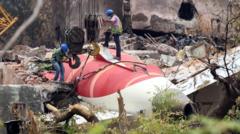Investigators have made a pivotal breakthrough in the investigation of the Air India flight crash by recovering the cockpit voice recorder (CVR), which is crucial for piecing together the events leading up to the tragedy. The Boeing 787-8 Dreamliner, en route to London, went down shortly after its departure from Ahmedabad on a Thursday, resulting in the deaths of 270 individuals, primarily passengers.
The CVR records valuable audio, including communication between pilots, alarms, and surrounding sounds, which will assist in reconstructing the flight’s last moments. Previously, the flight data recorder (FDR), which tracks essential flight metrics such as altitude and speed, was retrieved from the wreckage, both devices together referred to as the "black box." Despite the misleading name, these vital units are bright orange and engineered for durability during crashes.
The Aircraft Accident Investigation Bureau (AAIB) of India is spearheading the probe into the cause of the accident, with significant collaboration from US and UK teams, including representatives from the National Transportation Safety Board (NTSB) surveying the crash site. Additionally, the Federal Aviation Administration (FAA) and Boeing officials have been on-site, providing further support.
A high-level committee has been established by the Indian government to review the crash's circumstances, with plans to present a preliminary report within three months that includes recommendations for new operating procedures aimed at preventing future occurrences. Meanwhile, the emotional toll of the crash is palpable, as bereaved families face a slow and difficult process of retrieving the remains of their loved ones.
The AI171 flight crashed less than a minute after takeoff from Sardar Vallabhbhai Patel International Airport, colliding with a building housing medical staff at the BJ Medical College and Civil Hospital. Tragically, nearly everyone aboard perished, and ongoing efforts to identify victims are complicated by the condition of the remains.
By the weekend, authorities confirmed the retrieval of at least 270 bodies, with over 90 identified through DNA matching. One of the identified victims, former Gujarat chief minister Vijay Rupani, will receive full state honors at his funeral, an event reflecting the profound impact of this tragedy.
Families enduring the agonizing wait for news express despair over the uncertain timeline for identifying remains. Many have reported slow progress due to the extent of the damage to bodies, with officials indicating that matching DNA tests may take longer than originally anticipated.
As updates continue to unfold, the gravity of this disaster is felt deeply within the community, emphasizing not just the need for investigative rigor but also compassion for the families grappling with profound loss during this heart-wrenching period.


















